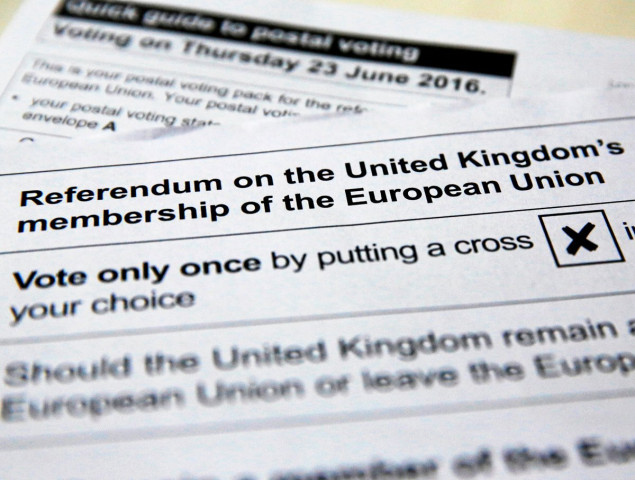The key arguments in Britain's EU referendum
From immigration to sovereignty, here are the main battleground topics in the referendum campaign

Illustration picture of postal ballot papers June 1, 2016 ahead of the June 23 BREXIT referendum when voters will decide whether Britain will remain in the European Union. PHOTO: REUTERS
UK's Cameron faces day of reckoning with EU vote
Leave: Those who want to leave the EU say Britain should be able to limit the number of migrants coming from the European Union through a points-based selection system. They are particularly worried about the pressure on public services like schools, hospitals and access to doctors created by mass immigration. There are also concerns about migrants who claim welfare and the pressure on housing. Net migration to Britain hit 333,000 in 2015 -- 3,000 short of the 2014 record. EU net migration equalled the record high of 184,000 people. Some 270,000 EU citizens moved to Britain for at least 12 months last year.
Remain: Those in favour of staying argue that EU migrants contribute more to the economy in taxes than they cost. They say that since they are young, they often do not place an undue strain on public services. EU migrants contribute 34 percent more than they receive from the state, according to 2013 research conducted at University College London. Prime Minister David Cameron has secured a deal meaning in-work welfare for new EU immigrants will be limited for their first four years if Britain remains in the bloc.
Leave: Out campaigners say leaving the EU would mean Britain would no longer have to pay its contribution to its budget -- estimated at almost £8.5 billion last year. Britain could seek a bespoke trading relationship with the EU and strike trade deals with growing markets like China and India, they say.
Discouraging exit: Brexit impact negative and substantial for UK, says IMF
Remain: In campaigners say EU membership means a stronger economy creating jobs, trade and investment in Britain. Some 45 percent of all British exports go to the EU and three million jobs in Britain are linked to trade in Europe, they argue. They say Britain would still have to pay for access to the single market if it wanted to remain inside it.
Leave: Britain would no longer have to abide by laws created in Brussels, campaigners say. Other states could not force through decisions against London's wishes and Britain would not have to abide by the European Court of Justice, they claim.
Remain: Leaving the EU would undermine Britain's standing in the world and could increase the likelihood of Scottish independence, campaigners argue.
As part of his reform package, Cameron has secured a commitment that Britain would not be bound by the EU's drive for ever-closer union.
Brexit: How Europe fell out of love with the EU
Leave: Brussels imposes too much red tape on British business, according to the Leave camp, which says the top 100 regulations cost Britain's economy more than £33 billion per year. If Britain leaves the EU, unburdened businesses, particularly small ones, would have more freedom to make their own decisions.
Remain: The Remain camp claims that if Britain left the EU, it would be bad for businesses as markets would be shaken by the uncertainty and it could take years to strike new trade arrangements with the EU. Britain would still be bound by single market rules if it wanted to remain in the free-trade European Economic Area and have to comply with EU standards if it wanted to sell goods in the EU market.



















COMMENTS
Comments are moderated and generally will be posted if they are on-topic and not abusive.
For more information, please see our Comments FAQ